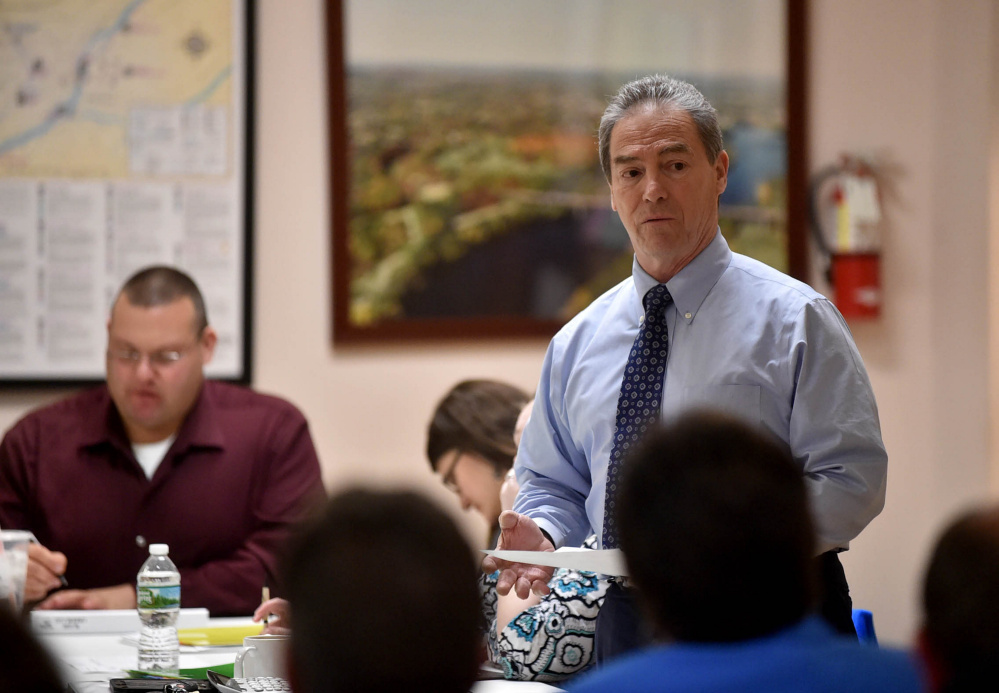WATERVILLE — The Waterville Board of Education on Wednesday took a second, final vote to approve a $21.7 million school budget for 2017-18.
The board made no changes to the budget, which already has received final approval from the City Council, so the action amounted to a rubber stamping of the budget.
The council on Aug. 1 voted unanimously to finalize a $40 million municipal and school budget for 2017-18 that represents a tax increase of only 53 cents per $1,000 worth of valuation, but also includes a new police cruiser, one education technician III position and security cameras for Waterville Senior High School.
The 7-0 vote resulted in a budget that is 3.1 percent greater than the $39 million budget councilors approved for 2016-17. The tax rate of $22.80 per $1,000 worth of property valuation increases by 53 cents, to $23.33 per $1,000, which means a homeowner with a house valued at $100,000 will pay $2,333 in taxes, a $53 increase from last year’s $2,280. Property owners who qualify for the homestead exemption will see their tax rate reduced from the full rate, however, by 88 cents per $1,000 worth of property valuation for primary residences, according to Mayor Nick Isgro.
City Manager Michael Roy said at Tuesday’s City Council meeting that tax bills will be mailed out later this week and early next week.
The Waterville Board of Education the week prior to the budget approval Aug. 1 requested that two education technician III positions and security cameras for the high school be added to the proposed budget; the city had wanted a new police cruiser in addition to a cruiser Colby College is buying for the city.
The council on July 25 voted unanimously to approve a proposed $40 million municipal and school budget that did not include $75,000 for two education technicians and the security cameras as requested by the school board, but councilors said they would explore possibilities for funding those items before the final vote Aug. 1.
Isgro, Roy and councilors discussed the issue and all supported maintaining a 53-cent increase in the tax rate the council approved July 25, Isgro said at the time.
With the proposal to fund one education technician and the security cameras for the high school, as well as a cruiser for the Police Department, a compromise was reached that worked for everyone, according to the mayor. He said Roy and the city’s finance director, Heather Rowden, were able to study the numbers to look at options for more revenue or reduced expenses so the three items could be funded in the budget.
Roy and Rowden recommended $53,000 in spending decreases in the proposed budget, including $25,000 for plow gear, $10,000 in a Fire Department boiler because a quote came in below the estimate, $3,000 for the Fire Department heating budget, and $15,000 in electricity, across departments. They recommended $24,000 be used from downtown tax increment financing money, for a total of $77,000 to be used for the cruiser, the education technician and the security cameras. The cruiser would cost $32,000; the education technician, $30,000; and the cameras, $15,000.
In other matters Wednesday, School Superintendent Eric Haley said the Alternative Organizational Structure 92 Board of Directors at its last meeting decided to do a feasibility study on whether to disband AOS 92 and bring back the three school systems of Waterville, Winslow and Vassalboro which now make up Kennebec Valley Consolidated Schools. Disbanding would mean returning to three unique municipal school systems, according to Haley.
Recent recommended changes by Governor Paul LePage to the funding formula for schools included eliminating all reimbursement for system administration, which includes pretty much anyone who works in the superintendent’s office, such as the superintendent, finance director, accounts payable and payroll, according to Haley. LePage’s reasoning, Haley said, is that there are too many of those positions that one well-run operation could handle for multiple schools. The schools would pay a regional center to do operations such as accounts payable and payroll, and the schools would be reimbursed.
“I think it can work,” Haley said.
He agreed with school finance director, Paula Pooler, however, that there are questions that need to be answered about such a proposal.
Amy Calder — 861-9247
Twitter: @AmyCalder17
Send questions/comments to the editors.




Comments are no longer available on this story